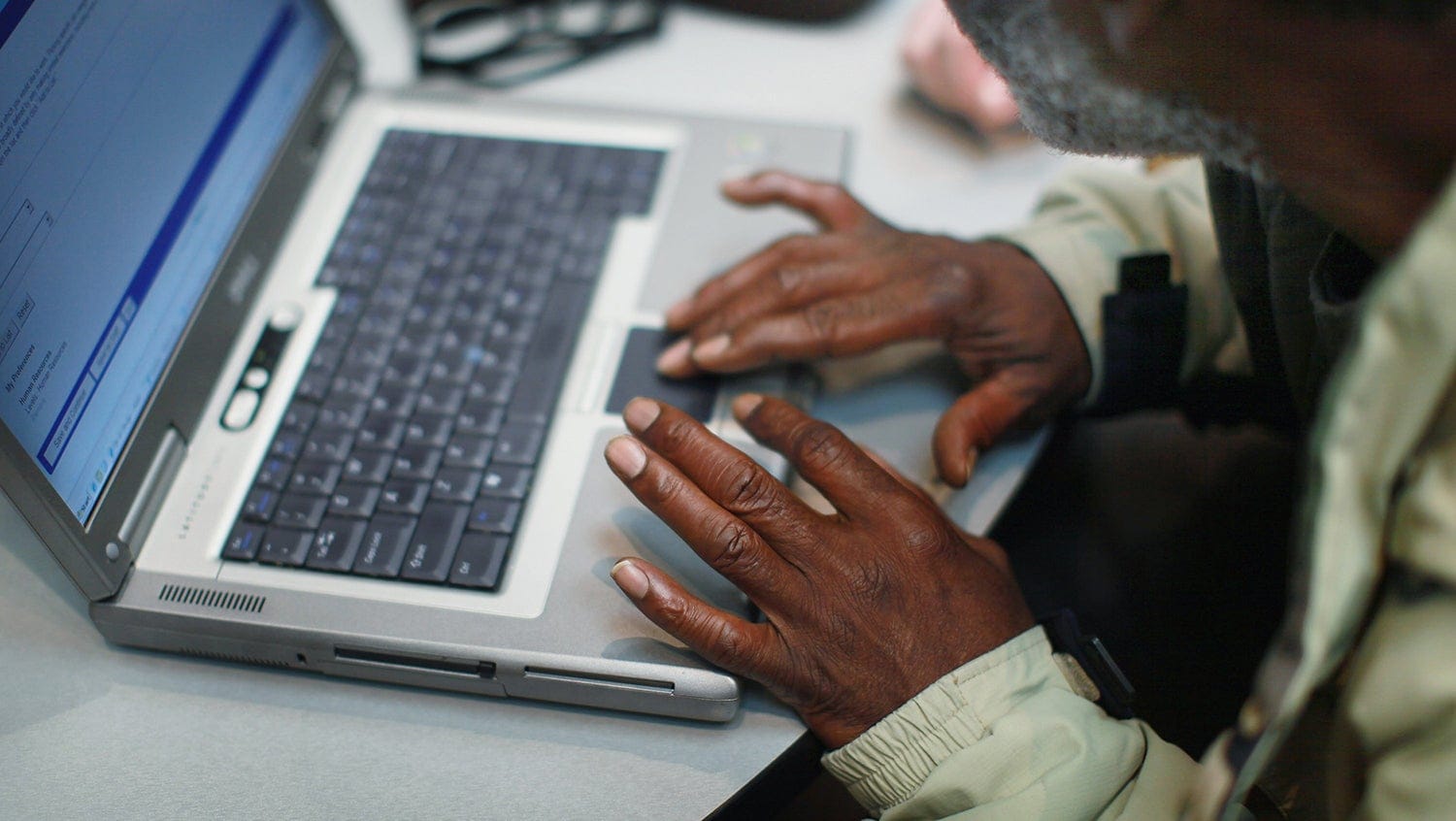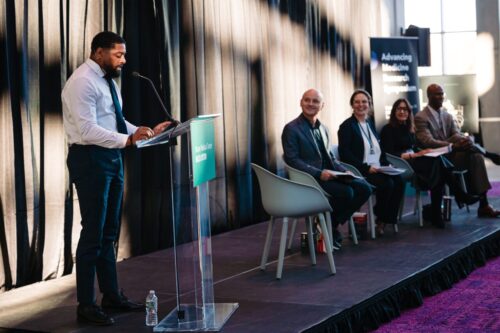
Getty Images
From resume building to employer networking, employment preparation emerges as a unique health service for U.S. asylum seekers in Boston.
For asylum seekers fleeing persecution, trauma doesn’t end after reaching the safety of U.S. soil. Survivors of torture face significant physical and psychological wounds that require specialized care.
In Massachusetts, the Boston Center for Refugee Health & Human Rights (BCRHHR) provides trauma-informed psychotherapy and social services to more than 400 such immigrants and refugees each year. The program is housed within the Immigrant and Refugee Health Center at Boston Medical Center, and among the psychiatrists, internists, and social workers, a career coach may seem like an unlikely member of this care team. But employment is a critical component of the healing process, the team says: It provides essential income for survival, as well as hope and motivation, key factors to healing the significant psychological trauma and depression endured by many asylum seekers.
“It’s amazing to see how someone changes physically. Employment is a very powerful treatment for someone’s well-being and sense of self,” says Linda Zimmerman, the career coach at BCRHHR. In her role on the care team, Zimmerman coaches asylum seekers, specifically survivors of torture, through the complexities of entering the U.S. labor market. She works with an experienced pool of talent: approximately 60% percent of her clients have a university education from their country of origin, and many had successful professional careers before arriving in America. Zimmerman helps these individuals identify their transferable skills and guides them toward a career path.
Understanding the road to employment in the U.S. for survivors of torture
The road to gainful employment is an arduous one for asylum seekers. Of the thousands of people seeking asylum in the U.S. each year, the majority arrive in the country with nothing, and they do not receive government funding for resettlement like refugees do. Asylum seekers also navigate a lengthy legal process to gain status, waiting nearly six months after their request for asylum to receive work authorization. In the Boston area, because they cannot generate income, most new arrivals live with host families in exchange for childcare or household services, while a less fortunate few are housed in the shelter system.
The entire process is taxing on a person’s physical and emotional health, especially with inherent barriers built into the system. Most clients rely on public transportation, which makes accessing services more difficult. Childcare is also a financial and logistical challenge for a newcomer who has to work. And despite postsecondary education among newcomers, many come from lower-resource countries and have to quickly upskill to adapt to the technologies in place for job search, while also managing English literacy challenges. Clients from more collectivistic cultures have to learn to integrate within the individualistic style of U.S. culture.
The resilience Zimmerman sees in her clients is profound, given their history of trauma, their social isolation assimilating to a new culture, and the multitude of daily barriers they face to receive support services. That is why BCRHHR integrates career services into the broader healthcare setting. The small, interdisciplinary team embraces a holistic approach, individualizing treatment plans that include team investment in a patient’s career success.
“It’s all in one place,” says Zimmerman. “When we have a clinical meeting, the career development program is part of it. Clinicians can ask, ‘How is this client doing with job search?” and I might say, “This person seems to be having some issues with interviewing — is there anything that I should know based on trauma history?’ Everything is connected.”
Addressing employment as a social determinant of health
Toward the end of the work authorization wait period Zimmerman steps in, advising clients on their resumes, connecting them to area programs and internships that could improve their skills, and educating them on the many digital platforms they will encounter in the job search process. The program provides group job readiness training several times per year in which clients combine self-paced, web-based learning with weekly meetings to reinforce and practice necessary job search skills. Participants also benefit from the social outlet these trainings provide, as it allows for a rare connection to people who share similar life experiences.
Once asylum seekers are granted work authorization, career placement requires taking the long view. At first, most people support themselves with low-wage jobs to pay for their basic needs, while also attending additional training courses on nights and weekends to strengthen their skill sets to pursue their chosen field of work.
“It’s a common misconception that these individuals just do low paying jobs, but this is a stereotype,” says Zimmerman, conceding that starter-type jobs are common, but typically sought after to provide economic support for basic needs while navigating higher education, job training, and skilled employment. “Given appropriate supports, services, advice, and opportunities to upskill, newcomers regularly gain a foothold in all of our major industry sectors and can accomplish a livable income.”
Coronavirus and policy pose new employment challenges
However, the events over the past three months have thrown the lives of BCRHHR’s patients into turmoil. Entry-level, frontline jobs are disappearing in the wake of the economic crisis. COVID-19 has pushed job preparation classes and prospective interviews to online platforms, adding another hurdle of complexity to the hiring process. The hardest blow came recently, says Zimmerman, when the Trump administration announced a policy change, effective August 26, requiring asylum seekers to wait a year, rather than 150 days, before becoming eligible to obtain work authorization.
The new policy has shaken Zimmerman and staff at BCRHHR. Their patients will have to subsist without income for a full year until they can begin starter jobs. The policy also impacts the timeline for patients to receive on-the-job training, participate in paid internships, and network with employers as job seekers, meaning many won’t be hired into their chosen field until two years after they arrive in the country.
Despite this tremendous setback, BCRHHR plans to expand career services to help refugees and economic immigrants receiving health services at Boston Medical Center’s new Immigrant and Refugee Health Center. It is a unique service that has incredible impact. Zimmerman sees the importance of employment as a social determinant of health embodied by each of the clients she coaches toward success.
“It ripples outward. Someone who wasn’t working now is working — they’re buying things, they’re paying taxes, they’re getting involved in their community, they want to give back,” says Zimmerman. “I mean, that’s what we’re all about here in the U.S., supposedly.”


